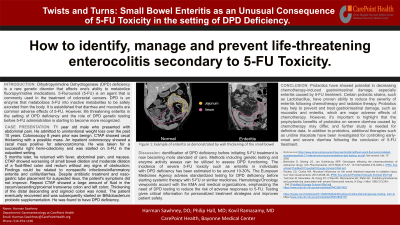Sunday Poster Session
Category: Colon
P0323 - Twists and Turns: Small Bowel Enteritis as an Unusual Consequence of 5-FU Toxicity in the Setting of DPD Deficiency
Sunday, October 27, 2024
3:30 PM - 7:00 PM ET
Location: Exhibit Hall E

Has Audio

Harman Sawhney, DO
Bayonne Medical Center
Bayonne, NJ
Presenting Author(s)
Harman Sawhney, DO1, Phillip Hall, MD1, Kovil Ramasamy, MD2, Dhanush Hoskere, DO1
1Bayonne Medical Center, Bayonne, NJ; 2CarePoint Health - Bayonne Medical Center, Bayonne, NJ
Introduction: Dihydropyrimidine Dehydrogenase (DPD) deficiency is a rare genetic disorder that affects one's ability to metabolize fluoropyrimidine medications. 5-Flurouracil (5-FU) is an agent that is commonly used in the treatment of colorectal cancers. DPD is an enzyme that metabolizes 5-FU into inactive metabolites to be safely excreted from the body. It is established that diarrhea and mucositis are common adverse effects of 5-FU. However, life threatening enteritis in the setting of DPD deficiency and the role of DPD genetic testing before 5-FU administration is starting to become more recognized.
Case Description/Methods: 71 year old male who presented with abdominal pain. He admitted to unintentional weight loss over the past 10 years. Colonoscopy 8 years prior was benign. CTAP showed cecal thickening with a possible mass. An inpatient colonoscopy showed a cecal mass positive for adenocarcinoma. He was taken for a successful right hemi-colectomy and was started on 5-FU in the outpatient setting.
5 months later, he returned with fever, abdominal pain, and nausea. CTAP showed worsening of small bowel dilation and moderate dilation of a fluid-filled colon and rectum without any signs of obstruction; Findings could be related to nonspecific infections/inflammatory enteritis and colitis/diarrhea. Despite antibiotic treatment and naso-gastric tube placement for suspected ileus, the patient's symptoms did not improve. Repeat CTAP showed a large amount of fluid in the cecum/ascending/proximal transverse colon and left colon; Thickening of the distal descending and sigmoid colon was noted. The patient eventually recovered and was subsequently started on Bifidobacterium probiotic supplementation. He was found to have DPD deficiency.
Discussion: Identification of DPD deficiency before initiating 5-FU treatment is now becoming more standard of care. Methods including genetic testing and enzyme activity assays can be utilized to assess DPD functioning. The incidence of severe 5-FU toxicity such as enteritis in individuals with DPD deficiency has been estimated to be around 10-30%. The European Medicines Agency advises standardized testing for DPD deficiency before starting systemic therapy with 5-FU or similar medicines. Hematology/Oncology viewpoints accord with the EMA and medical organizations, emphasizing the need of DPD testing to reduce the risk of adverse responses to 5-FU. Testing gives critical information for personalized treatment strategies and improves patient safety.
Disclosures:
Harman Sawhney, DO1, Phillip Hall, MD1, Kovil Ramasamy, MD2, Dhanush Hoskere, DO1. P0323 - Twists and Turns: Small Bowel Enteritis as an Unusual Consequence of 5-FU Toxicity in the Setting of DPD Deficiency, ACG 2024 Annual Scientific Meeting Abstracts. Philadelphia, PA: American College of Gastroenterology.
1Bayonne Medical Center, Bayonne, NJ; 2CarePoint Health - Bayonne Medical Center, Bayonne, NJ
Introduction: Dihydropyrimidine Dehydrogenase (DPD) deficiency is a rare genetic disorder that affects one's ability to metabolize fluoropyrimidine medications. 5-Flurouracil (5-FU) is an agent that is commonly used in the treatment of colorectal cancers. DPD is an enzyme that metabolizes 5-FU into inactive metabolites to be safely excreted from the body. It is established that diarrhea and mucositis are common adverse effects of 5-FU. However, life threatening enteritis in the setting of DPD deficiency and the role of DPD genetic testing before 5-FU administration is starting to become more recognized.
Case Description/Methods: 71 year old male who presented with abdominal pain. He admitted to unintentional weight loss over the past 10 years. Colonoscopy 8 years prior was benign. CTAP showed cecal thickening with a possible mass. An inpatient colonoscopy showed a cecal mass positive for adenocarcinoma. He was taken for a successful right hemi-colectomy and was started on 5-FU in the outpatient setting.
5 months later, he returned with fever, abdominal pain, and nausea. CTAP showed worsening of small bowel dilation and moderate dilation of a fluid-filled colon and rectum without any signs of obstruction; Findings could be related to nonspecific infections/inflammatory enteritis and colitis/diarrhea. Despite antibiotic treatment and naso-gastric tube placement for suspected ileus, the patient's symptoms did not improve. Repeat CTAP showed a large amount of fluid in the cecum/ascending/proximal transverse colon and left colon; Thickening of the distal descending and sigmoid colon was noted. The patient eventually recovered and was subsequently started on Bifidobacterium probiotic supplementation. He was found to have DPD deficiency.
Discussion: Identification of DPD deficiency before initiating 5-FU treatment is now becoming more standard of care. Methods including genetic testing and enzyme activity assays can be utilized to assess DPD functioning. The incidence of severe 5-FU toxicity such as enteritis in individuals with DPD deficiency has been estimated to be around 10-30%. The European Medicines Agency advises standardized testing for DPD deficiency before starting systemic therapy with 5-FU or similar medicines. Hematology/Oncology viewpoints accord with the EMA and medical organizations, emphasizing the need of DPD testing to reduce the risk of adverse responses to 5-FU. Testing gives critical information for personalized treatment strategies and improves patient safety.
Disclosures:
Harman Sawhney indicated no relevant financial relationships.
Phillip Hall indicated no relevant financial relationships.
Kovil Ramasamy indicated no relevant financial relationships.
Dhanush Hoskere indicated no relevant financial relationships.
Harman Sawhney, DO1, Phillip Hall, MD1, Kovil Ramasamy, MD2, Dhanush Hoskere, DO1. P0323 - Twists and Turns: Small Bowel Enteritis as an Unusual Consequence of 5-FU Toxicity in the Setting of DPD Deficiency, ACG 2024 Annual Scientific Meeting Abstracts. Philadelphia, PA: American College of Gastroenterology.
